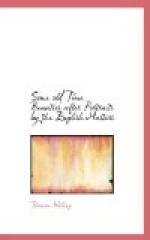In a series of boyish letters sent by the heir to the earldom to his father the ending of all is in this quaint phrase: “My duty to Mama.” The youth did his duty by his mother. She directed his tastes and studies, and when he was at college incited him to try for high honors, and urged, again and yet again, application to study; and through her persuasion he became a reading man. He entered Parliament when of age, in 1803. During the Fox and Grenville administration he held office as a lord of the treasury. When his mother was congratulated on his appointment, she said: “Jack was always skilful in figures, and his work is so much to his taste that I am sure he will do himself credit.” He did himself great credit. His career was consistently courageous, honorable, and beneficent. He had character! This is his mother’s best eulogy. She died in 1831, shortly after her son had become Chancellor of the Exchequer, in which office he earned his greatest repute as a statesman.
[Illustration: Elizabeth, duchess of Hamilton by read]
ELIZABETH GUNNING
The story of the Gunnings is as romantic as any ever wrought into imaginative narrative or incorporated in epic poem. The notorious damsels were daughters of John Gunning of Castle Coote, County Roscommon, Ireland, by the Hon. Bridget Bourke, daughter of Theobald, sixth Viscount Bourke of Mayo, whom he married in 1731. The family was wofully impecunious; so when the daughters, Maria and Elizabeth, grew into marvellously comely maidens, their mother urged their going on the stage to augment the faulty fortune. They went to Dublin, and there were kindly received by Peg Woffington, then in her glory as Sir Harry Wildair, and by Tom Sheridan, manager of Dublin Theatre. The stage had not then become the stepping-stone to the ranks of the nobility, so the girls were advised to adventure socially, with their faces for their fortunes. They had not the dresses to be presented in at Dublin Castle, but Sheridan supplied these from the resources of the green-room wardrobe. Attired as Lady Macbeth and as Juliet they made their curtsies to the Earl of Harrington, the then Lord-Lieutenant.
The hostess of the evening was the handsome Lady Caroline Petersham, bride of the Earl’s eldest son. Lady Caroline had been one of the “Beauty Fitzroys,” and had been a favorite belle in town before her marriage.
“When Fitzroy moves, resplendent,
fair.
So warm her bloom, sublime her air,
Her ebon tresses formed to grace
And heighten while they shade her
face.”
Walpole wrote of her in his poem on “The Beauties.” The raw Connaught girls outshone this dazzling hostess.




